Despite some characters being labeled heroes and others being labeled villains, there are very few truly good or bad characters in Gotham. All of them are some mixture of evil and neutral, with tiny specks of good thrown in here and there.
People often assume that if a person or character is on the side of the law, that makes them “the good side”. But this isn’t necessarily the case. Especially when the law itself has been corrupted. And in Gotham, there is very little to divide the law from the mob lords they supposedly “fight”. Everyone, excepting Jim Gordon, has been wrapped around Don Falcone’s calculating finger. Some may argue that this makes Jim a truly “good” character; but it has also been admitted on the show, by Jim himself and others who know him, that he fights criminals not so much to win real justice, but because he loves the thrill of the fight. And fighting for order and justice is simply a more traditional outlet for seeking out that thrill. Jim isn’t by any means a bad man, but he leans more toward neutral morality than truly good. Some may argue Alfred is a truly good character; but he too is more neutral than anything. All his actions are motivated solely by duty, and he will do anything (including encouraging bad behavior from Bruce) to protect the dignity of the family name and the child placed in his charge. The only truly good character I’ve seen on the show is Bruce Wayne himself, who at this point is only a child, and doesn’t yet have much part in the story’s main plot.
No, instead of fitting “good” or “evil” labels, each character has their own unique vision of good and evil. To me, this is no bad thing. It makes the show more interesting, the characters more intriguing. And out of all of them, Oswald is, to the majority of viewers (including myself), the one with the most complex and fascinating characterization.
For Gotham fans, you don’t pick the good or the evil side. Instead, you pick your poison; and Oswald Cobblepot seems to be the most well-loved poison on the show. That’s why, today, I’ll be delving into what makes him such a fascinating character. In this article, we will discuss and speculate about many popular and controversial aspects, such as character background, motivation, sexuality, alignment and morality, MBTI Personality Typology, and HP House Sorting. Let’s delve in to find out what makes the Penguin tick!
Character Background and Motivations:
Oswald was born into the Kapelput household, an old and once very wealthy family who resided in Eastern Europe until they fell on hard times and immigrated to the US. Oswald is the first in his family to go by the anglicized name, Cobblepot.
Oswald’s childhood is not described as a very happy time in his life. He had no friends and was bullied by other children severely — an experience that would stay with him and shape his motivations in adulthood.
Though not much is known about the majority of his family members, we are shown that he was very close to his mother, Gertrud. An eccentric and conniving woman, she passed many of her negative qualities on to him. In particular, the habit of gathering information about others to use against them for personal gain.
As an adult, Oswald’s experiences with bullying drove him to seek more power for himself. His desire to learn the ways of the Gotham underworld led to him being taken under the wing of Fish Mooney, a sadistic and powerful mobster, who treated him as both a son and a slave. When Oswald eventually betrayed her, Fish beat him, permanently injuring his leg so that he now walks with a limp.
From there, Oswald pretended to work for Maroni in order to learn his secrets, all the while working in secret as an informant for Falcone. Maroni eventually learned of this treachery from Fish Mooney; and now Oswald works for Falcone publicly, running a nightclub previously owned by Fish.
(Source: baskervilleshund.tumblr.com)
His thinking shaped by the relentless teasing he suffered years ago, Oswald now regards the powerful people around him as bullies. And it is his goal to show them up, and prove it takes brains instead of brawn to make it to the top. Despite his physical weaknesses, and the fact that he is underestimated by everyone around him, Oswald Cobblepot plans to eventually become the most powerful man in Gotham.
Sexuality:
Oswald’s possible sexuality is a complex subject. Some say he’s asexual and/or aromantic, as he seems to show absolutely no interest in having any sexual/romantic relationships with anyone.
(Source: salmaroni.tumblr.com)
Others are convinced he must be gay, due to his fixation on Jim Gordon.
(Source: raymukada.tumblr.com)
From what I’ve watched on-screen, however, as well as what I’ve read in interviews with cast and crew members, I’ve seen nothing to suggest Oswald has any sexual attraction toward Jim. He definitely has a child-like obsession with him. But its innocence more resembles admiration; or, at most, the simple sort of “crushes” young children develop on one another, when they are still too young to even understand what sex is. And every interview that has discussed their relationship confirms it comes from Oswald’s childhood loneliness, his desire for friendship — a privilege he has yet to enjoy with anyone.
(Source: brotherlyfeels.tumblr.com)
Asexual/aromantic is closer to the mark for him, I think, but not quite there either. To truly understand his sexuality, we have to take a closer look at Oswald’s relationship with his mother, Gertrud.
It has been strongly insinuated on multiple occasions that the relationship between Gertrud and Oswald goes beyond that of a mother/son relationship. In fact, Gertrud gets extremely upset whenever she fears Oswald might have acquired a girlfriend — not because she believes no one is good enough for her son, but because she’s jealous of any potential “other women” who might steal his affection away from her. It has also been stated in several interviews that their dynamic was inspired by the incestuous Bates’ relationship portrayed in Alfred Hitchcock’s infamous film “Psycho”.
You can’t approach the subject of incest between Oswald and Gertrud without also considering the almost inevitable possibility of sexual abuse. For a son to willingly enter into such a relationship with his own mother, without being conditioned to do so during childhood, is virtually impossible. And if a mother is willing to enter into such a relationship with her son, it’s highly unlikely she would be the sort of person to wait until her son came of age, or put much emphasis on consent. Healthy, platonic parent/child relationships do not produce incestuous relationships in adulthood. If the element of incest is there, then it was an element that was introduced early and, probably at first, unwillingly.
This idea is supported by the characters’ behavior toward each other on the show. Oswald’s attitude towards his mother has two elements that run together simultaneously — one of love, loyalty, and absolute devotion; the other of derision, anger, and bitterness. It is a classic symptom of abuse for the victim to show both these attitudes at once. This is because abuse victims are manipulated into believing their relationship with their abuser is normal, even good; while at the same time, their subconscious recognizes there is something wrong, making them feel trapped and bitter.
Another intriguing aspect of this is Oswald’s relationship with Fish Mooney. It is interesting to note that, out of all the powerful figures in Gotham, the one he chose to use to gain a foothold in the underworld — the one he chose to show false loyalty toward, only to betray and conquer in the end — was the only female mob boss in the city. A woman who, the show goes out of its way to point out, he developed a mother/son bond with.
(Source: fuckyeahgothamfox.co.vu)
During his service to her, Fish Mooney alternated between coddling Oswald like a beloved child and dominating him like a master does her slave. And ever since his betrayal, he’s constantly fought with zealous rage to dominate her instead. After all, if you still feel loyalty toward your original abuser, why break ties with them if you can instead channel all that hurt and anger toward someone who reminds you of them?
Even more interesting is Oswald’s behavior toward his victim, Carbone, in the episode “Penguin’s Umbrella”. After Carbone attempts to assert his power, Oswald “teaches him a lesson” by having him forcibly held down and stabbing him to death. As Carbone dies, Oswald seems to adopt his mother’s mannerisms, comforting him the way a mother would her child after a particularly unpleasant punishment or lesson.
(Source: gerperdy.tumblr.com)
This behavior is very telling. It’s not uncommon for victims to suddenly adopt the mannerisms or phrases used by their abuser, if their actions somehow subconsciously remind them of how their abuser has treated them in the past. Since Oswald suddenly adopted his mother’s behavior, something about his actions toward Carbone in that scene must have reminded him of something Gertrud did to Oswald long ago. Of course, it’s obvious Oswald’s mother never forcibly held him down and repeatedly stabbed him. But it doesn’t take much imagination to realize what the most likely alternative would be. What I find particularly chilling, though, is Oswald’s last words to Carbone. Especially when you consider he’s saying it as if he’s comforting and teaching a young child. “Love conquers all,” he says. Love leads to being dominated. Love is something that either conquers you, or becomes a tool you use to conquer other people. And from the way he says it, it sounds like it’s a lesson he has learned from experience. It wouldn’t surprise me if he was told those same words while being “taught” something unpleasant as a young child.
This association of love and conquering, as well as the fact he has been bullied, abused, and dominated by absolutely everyone in his life growing up, has not led him to possess a healthy view of relationships. He has been the victim for far too long. As a result, he is not necessarily attracted to a certain type of person so much as he is a certain type of situation. Namely, a situation where he finds any person of great power and discovers some way to conquer them. This type of situation allows him to be the one to dominate for once. For once in his life, he gets to be the victor.
While most characters on television display a lustful gleam in their eye whenever a pretty face or tempting figure turns their head, Oswald only has that gleam when something arouses his sadism. When he’s forced to kill, when he’s given the opportunity to harm others, or when he believes he is finally about to win his cat-and-mouse game with Fish. Love, hate, sex, violence, and domination have been forcibly melded together in his mind too strongly to be separated. Any sexual identity he would have had instead gets channeled into his desperate desire for power. His sexuality is no longer about sex. Instead, his lust has become literal bloodlust.
(Source: gobblepotfans.tumblr.com)
Alignment and Morality:
Despite the fact he seems to greatly enjoy hurting people — a trait commonly associated with Chaotic Evil — Oswald does surprisingly well at keeping his bloodlust in check. Instead he prefers to take the tactical route, only killing if it will serve some greater purpose in his plan, or if the victim deeply insulted him or someone close to him. For this reason, I would classify Oswald as being Neutral Evil. Wikipedia describes Neutral Evil as follows:
“A Neutral Evil character is typically selfish and has no qualms about turning on its allies-of-the-moment, and usually makes allies primarily to further its own goals. A Neutral Evil has no compunctions about harming others to get what it wants, but neither will it go out of its way to cause carnage or mayhem when it sees no direct benefit for itself.”
Although many viewers (including myself) have found his character to be extremely sympathetic, I believe Oswald is far too evil to count as either an anti-hero or an anti-villain. He is firmly in the villain category. That is not to say, however, that he doesn’t have a good side. In fact, he has much more good in him than even he realizes. And it manifests itself in his relationship with Jim Gordon.
Oswald has convinced himself that the reason he constantly pursues Jim’s acquaintance is because he wants him as an ally. A partner in crime that will help him rise to power.
(Source: russianhookers-and-cheapgin.tumblr.com)
But in reality, it’s much more than that. Jim represents goodness and hope for Gotham which, on some level, still appeals to Oswald. Despite his greed and personal ambition, he can’t help coming back to Jim. He can’t stop hoping there are good men out there. Men who want more than power and domination over others. Someone who wants to stop the bullies in this world once and for all.
(Source: down-the-muddy-river.tumblr.com)
When Oswald reaches out to Jim, it is both a cry for friendship and a last leap of faith in law and order. It is the last faint traces of goodness in his character trying to hold on.
However, as a mostly villainous character, Oswald’s personality does not much appeal to Jim, who believes himself to be firmly on the side of good. This places what’s left of Oswald’s morality in a precarious position. And it won’t take much more rejection for those little bits of goodness to slip away forever.
(Source: down-the-muddy-river.tumblr.com)
MBTI:
As more and more people have been learning about MBTI Personality Typology, debates on the psychological wiring of fictional characters increasingly dominate fandom discussions. Everybody wants to know what type their favorite characters are. So what character analysis would be complete without some MBTI speculation? Now, it’s well known people can be much harder to type when they are unhealthy or unstable individuals. So, of course, typing villains can be particularly challenging. Despite this, I am still confident in saying Oswald Cobblepot is an ISTJ.
ISTJs are defined by their four main cognitive functions, Si - Te - Fi - Ne.
Dominant Function: Si
Because Oswald’s dominant function is Si, he belongs to the SJ Temperament, also known as the Guardians. Si looks to the past, as well as one’s peers, to figure out the “correct” way of doing things. There’s a good reason Oswald was nicknamed the “boy who loves his mother”, and not just because of their unusual relationship. It is the trademark of Si to feel great loyalty to one’s family and family background.
Even though he is normally a very tactical person, Oswald employs a very old fashioned, outdated way of speaking to others, despite the fact this isn’t the best method of communicating with those involved in his plan. Interviews with cast and crew have confirmed that the reason he does this is because his mother speaks this way and taught him to do the same. Oswald views this as the “correct” way to speak, and wishes to honor his mother in this matter. Like all ISTJs, Oswald highly values tradition, as well as good manners.
(Source: okimi79.tumblr.com)
Auxiliary Function: Te (with Inferior Ne)
Oswald’s second strongest function is Te, a highly motivating and organized function. Hard working and punctual, Te drives people to get things done. Though, as an introverted Te-user, ISTJs are much less likely to lead or conduct their plans center-stage. They instead prefer to work quietly, behind the scenes.
One of their biggest strengths is the large mental database of facts that only they seem to know. As sensors, ISTJs are very aware of their surroundings. They listen, they observe. And they make mental notes on all that they learn, so they can use these facts to their tactical advantage later.
(Source: gobblepotfans.tumblr.com)
Like most Js, ISTJs are naturally step-by-step planners. Their planning process is assisted by their inferior function, Ne, an analytical tool that evaluates situations and helps them see possibilities. It allows them to be very detail-oriented and meticulous in their mental process, as they formulate clever and intricate foolproof plans.
(Source: gobblepotfans.tumblr.com)
There, however, the benefit of their Ne ends. While individuals with high usage of Ne become very analytical, intellectual people, Ne is the ISTJs inferior, and therefore weakest, function. They are far more sensing — and therefore practical — than they are intuitive. An ISTJ will not see the value in philosophy, mind games, or thinking for its own sake. And in fact, are likely to become annoyed or suspicious when others attempt to force them into such activities.
(Source: felicity-smoakqueen.tumblr.com)
Tertiary Function: Fi
Unlike Fe, which expresses emotions outwardly and reaches out to others, Fi is directed inward. Because of this, most Fi users put great value on their emotions and inner harmony. For ISTJs, however, Fi is shown in a more unique way. For them, Fi does not refer to valuing inner emotion so much as it does their seeming inability to express emotion outwardly. And what emotion they do show can sometimes feel contrived or insincere. They are, on average, serious, calm, and private people. No one but the ISTJ really knows what he is thinking or feeling.
Not only are ISTJs often out of touch with their own emotions, they often have difficulty empathizing with others. They generally are not very good at understanding people, making them feel comfortable, or keeping them entertained. A great example of the latter is the fact that Oswald, despite being very clever in his manipulations and schemes, continuously fails at pleasing guests at his newly acquired club.
(Source: baskervilleshund.tumblr.com)
Always thinking practical, ISTJs easily forget or ignore the feelings of others, in favor of carrying out their complex plans. Because of this, they do not have much time for socializing, and can often come across as cold and aloof. They may even neglect the people they care most about.
(Source: salmaroni.tumblr.com)
Not only this, but ISTJs often neglect their own needs. Not wanting to be distracted, they are all work and no play. At least, until the job is done. Once an ISTJ has fully carried out his grand plan, he may then have a victory celebration. In his own introverted way, when no one is around to see.
(Source: russianhookers-and-cheapgin.tumblr.com)
Hogwarts House:
There’s no questioning that Oswald Cobblepot is in Slytherin House. And not just because he’s a villain (as a Slytherin myself, I have to point out that not all Slytherins are villains, and not all villains are Slytherins!). If you think of all the main traits for which Slytherins are famous, they describe Oswald with amazing accuracy. Crafty and cunning? Check. Desiring of power and status? Check. Will do anything to achieve his goals? Once again, check.
(Source: fuckyeahgothamfox.co.vu)
Another defining characteristic of Slytherin house is that, although they tend to mostly look out for number one, regard others with suspicion, and can be hesitant to trust, Slytherins are also known for their intense loyalty and sense of brotherhood. Because of this, each has a small group (or sometimes only one or two people) who they will always stick by and defend to the death. This describes Oswald very well. He is so out for himself that he practically lives in his own little bubble. No one fully knows what he’s thinking or planning except himself. He doesn’t have friends, and only socializes with others if he thinks it will gain him something. Yet, he would go to the ends of the earth to make Jim Gordon smile. And if you dare to insult his mother? Well…
(Source: milkovichgifs.tumblr.com)
Finally, the last thing to prove once and for all that Slytherin is his true home is the fact that he shares a seemingly contradictory characteristic with many others in Slytherin house. Namely, their habit of being obsessed with pride and self-respect, but also willing to subject themselves to humiliating begging and flattery.
The Slytherins we meet in the Harry Potter series put great emphasis on their power, their money, and especially their status as purebloods. Yet they are perfectly willing to become the groveling slaves of Lord Voldemort. And then there’s the moments of flattery and shameless cowardice the normally smug Malfoy displays throughout the series. People often read this as Slytherins accidentally showing their “true colors”, their curtains of pomp and pride drawing away to show the true weakness underneath. But what people fail to take into account when they assume this is that, with Slytherins, everything is tactical. Everything is part of a much larger plan. Slytherins know that playing the part of the flattering, groveling slave can be a very useful tool. And being first and foremost cunning, they are not going to let their pride get in the way of using it.
This willingness to voluntarily enter into humiliating circumstances is what separates Slytherins from the other houses with which they are often compared. Slytherin and Gryffindor, for example, are two houses famous for being very similar to each other, due to their fixation on reputation — Gryffindors on their reputation as being brave, and Slytherins on their reputation as being powerful. However, while a Gryffindor would rather die a hero than live with the reputation of being a coward, a Slytherin would gladly sacrifice their reputation to survive the battle and go on to win the war. After all, a reputation can easily be rebuilt once victory is at hand. Slytherins play the long game. Why lay down your life to avoid a moment’s shame, when that shame can earn you a lifetime of power later?
This characteristic is a very important aspect of Oswald’s characterization, and is also the aspect most frequently misunderstood by viewers. Just as they did with the Slytherins in the Harry Potter series, viewers mistake this tactical move as a sign of weakness. “He’s not powerful,” they say. “He’s a pathetic, groveling weakling, and everyone around him knows it. He’s not fooling anyone. You need only look at him to see he doesn’t actually mean a single polite word that comes out of his mouth. He’s only trying to suck up to powerful figures, in the hope they might share some of their power with him.”
What they don’t see is that the whole thing is a double play, a trick based on what he knows about his own strengths and weaknesses. He knows very well that his biggest weakness is his inability to hide his ambition. Therefore, his smartest move is to purposely let it show clearly before all his enemies, but misdirect it. When people like Fish, Falcone, and Maroni see Oswald not-so-subtly sucking up to them, they assume they’ve figured out his secret plan. They assume Oswald is trying to get on their good side in the hopes they will promote him, make him their special right-hand man, and allow him to profit from the shadow of their glory. By doing this, Oswald is able to distract them from his true secret. Because in reality, he doesn’t want to get on their good side so they’ll share their status with him. He wants them to underestimate him — just enough to allow him to discover their secrets — and play them against each other. In the end, his weak groveling and bad flattery serves as the ultimate disguise.
(Source: fuckyeahgothamfox.co.vu)
It may be difficult for some to understand how Oswald could humiliate himself the way he does without actually being the pathetic weakling he pretends to be. After all, how could someone literally grovel at someone’s feet, unless they had an enormous lack of self-respect?
(Source: beg-for-mercy-twice.tumblr.com)
But actually, it is his self-respect that allows him to do it. Or, to be more accurate, what he does with his self-respect. It’s a well known fact that the more confident you are, the more free you will be to make a fool of yourself if the situation calls for it. Oswald derives his pride and self-respect from his cleverness. And this pride is protected by his confidence in it. No matter what humiliating act he has to subject himself to in order to make it to the top, he knows he’ll come out of it just as clever as he was before. His self-respect is locked up, secret, safe inside himself where no one can touch it or take it away. All he loses from his groveling and flattery is the good opinion of the mob bosses he manipulates. And that will be easily remedied once he becomes the most powerful man in Gotham. In the meantime, their good opinion is not worth having, as they are not nearly as great as they pretend to be. Just as Oswald’s willingness to subject himself to humiliation is a sign of inner confidence, the mob bosses’ need to constantly assert their status and dominance is a sign of lack of confidence. They’re the ones who, at all times, feel they need to prove something to everyone around them. Whereas, Oswald only has one thing to prove: that, for all their riches and power, it is instead the ever-underestimated Oswald Cobblepot who has the confidence and cleverness to beat them all in the end.
After his long experiences with being mocked and taunted, Oswald knows a cowardly bully when he sees one. It is no wonder, then, that Oswald would be unafraid to make a fool of himself in front of such people. He knows it’s just a game to turn the bullies’ pride against them, dethrone them, and take their power. He knows that, deep down, they’re hypocrites. All brawn and no brains, pompous, and gullible. Although people might say you make yourself into a fool when you grovel and flatter, Oswald knows that, in reality, it’s those who get taken in by groveling and flattery who are the actual fools. And being a weak, pathetic nobody in the eyes of hypocritical, cowardly fools doesn’t say much against you. Especially when you’re secretly the cleverest one in the room.
(Source: fuckyeahgothamfox.co.vu)
The media is filled with black and white characters. Characters who are either good or evil, hated or sympathetic. Characters who value life and are cautious in whose life they take; characters with bloodlust who want to kill everyone. Characters who are humble and satisfied, who don’t desire any power; and characters who wear their pride and greed on their sleeve, openly asserting their power on all those around them. But the best kind of characters are the in-between characters. The carefully constructed characters like Oswald Cobblepot who, like most complex humans, can be all of these things at once. He can be sympathetic, yet despicable. Love others, yet hate them; sometimes at the same time. He can be bloodthirsty, yet cautious. Desperate, yet controlled. He will do everything for the sake of proving himself powerful to others, yet humiliate himself in front of others to gain that power. He is weak and broken, yet unstoppable. And that is what makes him the most dangerous villain in all of Gotham. That is what makes him one of the greatest characters I‘ve ever had the pleasure to watch.
(Source: crawlingmist.tumblr.com)




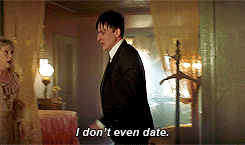

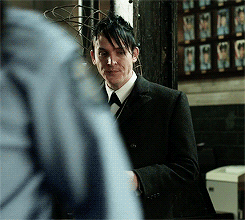
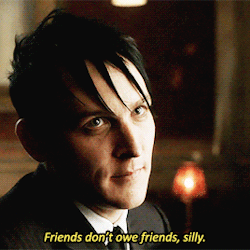











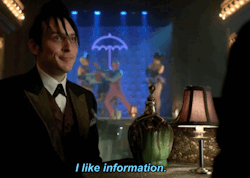



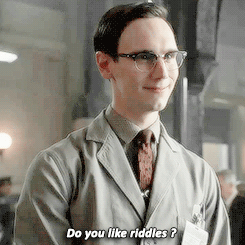



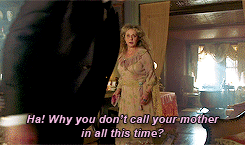


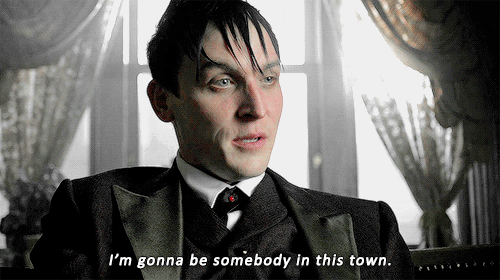









Hey! I just read the post and I love how well written this is. I'm glad to see that others see the reasons behind is seemingly weak actions the same way as I see them :). There are some points that maybe different then my idea of Oswald however. This doesn't mean I think my ideas/opinions are the right ones, but I just hoped you would take a look at it and tell me what you think? (btw sorry for my English, it's just not my first language xS btw part 2: please note that I'm not trying to beat your ideas down, as I'm only talking about the things I disagree on, it's just that I'm curious whether people agree with me or not. I swear come in peace!)
ReplyDeleteFirst of all, I believe without a doubt that Oswald's mother's love goes farther then just motherly love. I also think that her jealous and possesive behaviour might have damaged Oswald as he grew up. My theory is that Gertrud wasn't able to handle the death or abandonment of Oswald's father. I think it broke her and she just pushed her possesive, jealous and needy behaviour towards her son. The woman is mentally very weak and I don't think (and from here on I disagree with your idea) that she was able to abuse him either mentally or physically. But like I said, it did mark him because I think her needy and clingy behaviour had made his already tiny world even smaller, and of course, the lack of a normal mothers love is not something to be underestimated. But I don't think she would've done him any harm besides those things, so it can't really be called abuse because she actually does wish the best for her son.
In another part of the article you said that the affection Oswald has for Jim as innocent admiration. I believe that Oswald behaves like this innocent puppy around Jim so that Jim might take a liking in him. As Oswald is a Te, I think that this affection might not be honest. Not that I don't think he has respect for Jim's honest ways of doing things, but it's more that I think that the reason that Oswald is trying his hardest to befriend Jim is because Oswald realized that once he has Jim on his side, he knows that he will be able to trust Jim blindly, something which is very usefull. Why I don't think he really likes Jim that much, is because Jim is always pushing Oswald around, something which Oswald absolutely can't take. Like you said, Oswald is able to humiliate himself to get what he wants, playing this role of admirer. I think of Oswald's sudden outburst of anger and the fact that he betrays Jim despite his extremely loyal character (remember the scene where he pretended the old couple had escaped), are the proof of this idea. I think Oswald is only loyal to those who never look down on him, because he respects those who respect him. From all the people he knows, his mother is the one fitting this description, making him very angry whenever someone dares to touch her. I know that Oswald is more loyal to Jim then other people, but that's because Oswald does respect Jim for his honesty and the fact that he doesn't look down on Oswald all that much and of course because they're kinda-sorta friends haha.
That's all, I hope you'll tell me what you think of this :)
Greetz, Lisa
Penguin is the antithesis of istj. I don't see him as the stereotypical istj type. ISTJ's are not typically seen as colourful, enigmatic, prophetic crime bosses. Compare and contrast his personality to that of the conventional and responsible Jim Gordon.
ReplyDeletehttp://funkymbtifiction.tumblr.com/post/130637416612/gotham-oswald-cobblepot-infj
http://funkymbtifiction.tumblr.com/post/100107030546/gotham-jim-gordan-istj
Rodney
This was a brilliant outlook on my favorite character on Gotham!
ReplyDelete